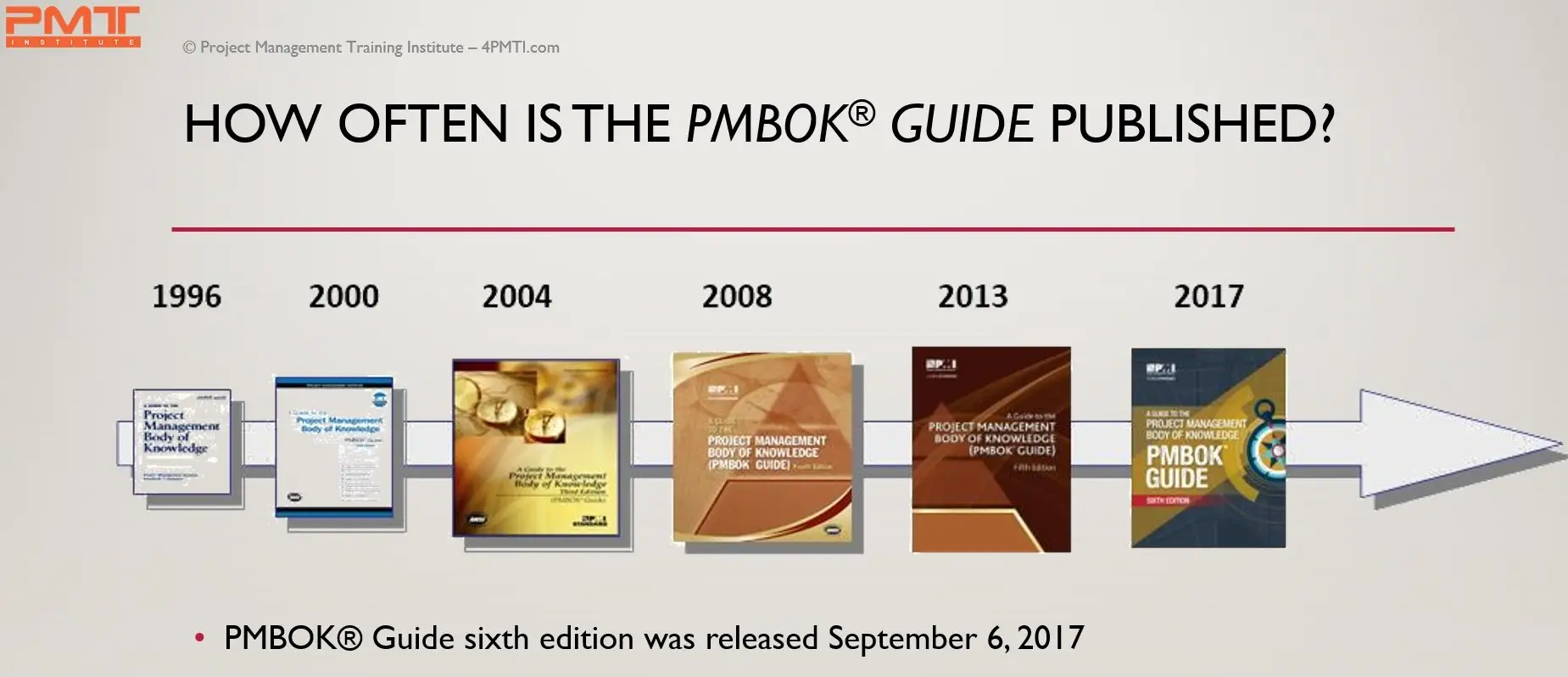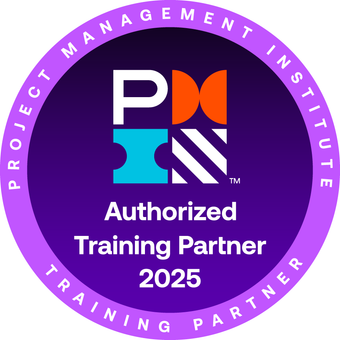PMBOK 6th Edition Guide 2024: Release Date, Latest Version Changes, PMI Knowledge Areas for Project Management (PMP)
Project Management Institute's PMBOK® Guide is the gold standard in project management. For it to remain so, PMI has to update the standard every so often. Historically, this happens every 4 to 5 years, and that time is here again. A Guide to the Project Management Body of Knowledge (PMBOK® Guide) 6th Edition was released September 2017. When the Project Management Institute (PMI)® makes a new release of the PMBOK® Guide, it causes fear and anxiety to some while also causing, excitement and eagerness to others.
When was the official PMBOK® Guide 6th edition released?
The official version of the PMBOK® Guide sixth edition was released September 6, 2017.
When does the PMP Exam change?
The PMP exam is going to change on March 26, 2018 to reflect the updates on the PMBOK® Guide 6th edition.
In this article, let's learn what PMBOK® Guide is, why it changes, for what reason PMI makes these changes, what specific changes have occurred in the PMBOK® Guide in the 6th edition, and most importantly, how do these changes affect the Project Management Professional (PMP) certification exam. We will also talk about how to prepare for the new PMP exam and efficiently pass the test without unnecessary stress.

What is the PMBOK® Guide?
PMI provides global leadership in the development of standards for the practice of the project management profession throughout the world. One of their significant accomplishments is the Institute's evolving standards document - A Guide to the "Project Management Body of Knowledge (PMBOK® Guide)". PMBOK® Guide is a globally recognized standard for managing projects in today's marketplace. In September 1991, the PMBOK® Guide was honored as a formal American National Standard by the American National Standards Institute (ANSI). PMI is committed to the continuous improvement and expansion of the PMBOK® Guide , as well as the development of additional standards. This standard gets an update roughly every four or five years. The first draft content was developed by Project Management Training Institute (PMTI) Instructor and Expert, Max Wideman under the name "PMBOK". Later this was updated to a "guide" and thus, in 1996, PMI published the first PMBOK® Guide. The PMBOK® Guide is the most widely recognized standard by project managers across the world and provides guidelines that are industry neutral and can be applied across a wide variety of disciplines, industries, experience levels, budgets, and timelines.
Why and how often does the PMBOK® Guide change?
PMI published the first edition of the PMBOK® Guide in 1996 which was based on the earlier work of PMTI master trainer and project management pioneer, Max Wideman. Since the profession of project management is constantly evolving based on recent theories, ideas, ideologies and philosophies, it becomes necessary to update the Guide to the Project Management Body of Knowledge as well. Thus, PMI updates the PMBOK® Guide roughly every four or five years. Thus, there was a PMBOK® Guide 2nd edition in 2000, a 3rd edition in 2004, a 4th edition in 2008, and a 5th edition in 2012, and now, the 6th edition in 2017.
What change occurred in the previous PMBOK® Guide editions?
Each of these editions included changes. Some editions had minor and some had major improvements. PMTI Founder and CEO, Yad Senapathy, who was one of the leaders of the 5th edition development team and a significant contributor says, "The 5th edition incorporated a much needed and seeming apparent miss - the stakeholder management into the PMBOK®Guide. The guide now expands its emphasis on the fact that processes alone can't run a project, people do". With each PMBOK® Guide edition release comes similar changes in the relevant exam content, the PMP exam and the Certified Associate Project Manager (CAPM) exam, including the quality and the type of questions exam takers encounter. The 6th edition of the PMBOK® Guide released in September 2017, includes some significant changes to reflect the current industry trends that can only be described as progressive and impactful from an industry and the PMP and CAPM exam perspective.
The 6 Changes to the PMBOK® Guide 6th Edition
The new PMBOK® Guide 6th edition is a whopping 978 pages, including the Agile Practice Guide. When compared with PMBOK® Guide 5th edition, which was a measly 616 pages, the 6th edition is one of the largest content updates to date! Just the Agile Practice Guide is 183 pages. Clearly, there are monumental changes, particularly from an Agile perspective. Expect equally monumental changes in the exam content.
PMI has made several changes to the PMBOK® Guide sixth edition. The most critical PMBOK® Guide 6th edition changes from the perspective of passing the PMP exam span six areas over a broad spectrum. Let us delve deeper into these areas:
1) Agile (Adaptive PM) Addition
Agile and adaptive practices are now a big part of all business strategy and projects. This otherwise "lean" or lightweight (mainly technology) management philosophy had already made its entrance in the PMBOK® Guide 5th edition. But, the upcoming 6th edition will feature significant additions. These changes are based on PMI's research on the growing influence and application of Agile, Scrum, Kanban, Lean, XP, and similar adaptive and change-driven project management methodologies. The changes include- a) Agile and adaptive environment considerations in each knowledge area. PMI discusses how the knowledge area is applicable over a range of predictive to adaptive life cycles.
- b) Agile related ITTOs (Inputs, Tools & Techniques, and Outputs) throughout the PMBOK® Guide
- c) A separate appendix on Agile, Iterative, Adaptive, and Hybrid environments
- d) Although, not part of the PMBOK® Guide, a separate Agile Practice Guide has been released with the PMBOK® Guide 6th edition
If you are exposed to Agile processes and have been using terms such as iterations, product backlog, sprint backlog, user stories, release planning, iteration or sprint planning, kanban board, refactoring, test driven development, scrum master, agile coach, etc. you will be delighted to see them and many more Agile practice ideas in the PMBOK® Guide sixth edition. Expect agile terminology to become part of the standard PMP exam. Expect tightening of the PMI-ACP exam as well.
2) 3 New Processes
No surprises here. The PMBOK® Guide has gone from
- a) 39 processes in the 3rd edition to
- b) 42 processes in the 4th edition to
- c) 47 processes in the 5th edition to
- d) 49 processes now in the upcoming 6th edition
By adding 3 new processes and removing one (Close Procurements), PMI has a net gain of 2 processes in the new PMBOK® Guide sixth edition. Although it can be argued that this does not simplify the PMBOK® Guide, it has made it, without any question, more holistic and fills the gap in areas that were not addressed adequately in previous editions. More importantly, PMI has, through their research and work, identified emerging practices that have solidified to generally accepted principles and updated with new processes.
Specifically, PMI has added the following 3 processes:- i.This process serves to expand the Knowledge Management industry paradigm of managing information within the project. It starts from collection of "raw data" that is then transformed to "integrated information", which in turn is converted to "knowledge" to assist in "decision making". Additionally, this process addresses the need to learn lessons throughout the project lifecycle, and delivers a "lessons learned register" as an output. This is, in our opinion, a great addition. We live in a world of Big Data and an information economy regardless of industry, and managing Project Knowledge and learned lessons is critical for realizing benefits and upward traction in projects.
- ii.This addition fills the gap that existed between the 5 planning processes and the one monitoring and controlling process in Risk Management knowledge area that have existed over several PMBOK® Guide editions. This process was integrated with the "Direct and Manage Project Work" process in earlier PMBOK® Guide versions. Considering the importance of risks on projects, this is a welcome addition. Additionally, PMI has recommended a new risk response, Escalation, for risks identified, but that fall outside the scope of the project, to transfer them to the relevant outside person.
- iii.Control Resources is a fair addition to the PMBOK® Guide. The process "Manage Project Team" which allows a PM to address issues related to team member performance continues to carry through from the previous editions. However, as every project manager recognizes, it is also important to assess actual vs. planned usage of equipment, material, supplies, and human resources. In this latest edition the term team resources is introduced to mean human resources and physical resources to mean equipment, material, and supplies. It remains a debatable issue whether a project manager "controls" the team resources specifically.
3)Knowledge Areas, Process Name Changes, and Shuffling of Processes
There are quite a few of these changes across this PMBOK® Guide. They fall into two categories:
- a. Change of Name of Knowledge Areas - When these happen, these are notable changes.
- i. The change of "Project Time Management" to "Project Schedule Management" is a synonymous and an appropriate switch.
- ii. Change of the process "Project Human Resource Management" to "Project Resource Management" represents a proactive stance from PMI for project managers to keep an eye on all resources - not just human resources. This includes physical - equipment, supplies, and material, and of course, human resources.
- b. Change of Name of Processes -
- i. Plan Stakeholder Management to Plan Stakeholder Engagement
- ii. Plan Human Resource Management to Plan Resource Management: This follows the change of the knowledge area above.
- iii. Control Communications to Monitor Communications
- iv. Control Risks to Monitor Risks
- v. Control Stakeholder Engagement to Monitor Stakeholder Engagement
- vi. Perform Quality Assurance to Manage Quality.
- According to PMI, market research shows majority of quality tools and techniques are no longer used in the industry and quality in today's world refers to managing quality to the quality management plan.
- This is a shift of name that does not gel with the industry standard terminology of "Quality Assurance".
4) PMs are no longer "Control" freaks!
PMI has made a conscious attempt to move away from the phrase "Control', and to instead use "Monitor" where applicable, particularly in processes that involve people. Here are the changes of names:
- i. Control Communications to Monitor Communications
- ii. Control Risks to Monitor Risks
- iii. Control Stakeholder Engagement to Monitor Stakeholder Engagement
However, the following processes continue to have the word control in them for good reason -
- a) Monitor and Control Project Work,
- b) Control Schedule,
- c) Control Costs,
- d) Control Quality,
- e) Control Procurement, and
- f) the newly added process of Control Resources.
5) Closing Procurement is closed out from PMBOK® Guide
This is another major change in our opinion. PMI opined that several project managers do not have the authority to close contracts and/or procurements and thus, the actions that are related to closing procurements have been rolled into control procurement. From a PMP exam preparation standpoint, this does not mean the content related to Close Procurements is removed. It has just been transferred to Control Procurements and Close Project or Phase.
6) The Role of the Project Manager
Given the changing role of the project manager and the approach to leadership in project management, PMI has included a new section on defining the ever-expanding role of the PM. Whether it be referred to as a project director, administrator, or team leader, commonly associated with the PMP credential; agile coach, servant leader, team facilitator, expediter, or team lead, commonly associated with Agile leadership; or the many other names used in the industry. This section now also addresses PMI's Talent Triangle encompassing the leadership, strategic, and technical project management skills and competencies that drive the modern project manager role.
Miscellaneous Changes
There are many other cosmetic changes. PMI continued to expand the trends and emerging practices to help PMs stay abreast of potentially useful practices. PMI has organized many ITTOs into logical groups such as data gathering, data analysis, data representation, decision making skills, communications, and interpersonal skills.
How do these changes affect the CAPM and PMP Exams?
Clearly, there are quite a few changes that we should expect to affect the PMP and CAPM Exams. There are several things to consider in determining how big the impact would be of these changes on the exams. Let's take a look at them.
- i. The number of processes has gone up from 47 to 49. While that in itself does not predict a difficult exam, any good PMP certification training must target to train for more "functions" within project management and their details. The content of the course materials will become expansive, more in-depth, and more inter-connected.
- ii. There are three new processes. Thus, there will be at least 5-10% of new content to acknowledge in your PMP exam preparation.
- iii. Most importantly, there is Agile and Adaptive environments including Scrum and Kanban related content strewn all over the PMBOK® Guide, along with a brand-new appendix and practice guide to expand its coverage. Your CAPM or PMP Certification depends on learning the terminology, processes, and application of Agile. There is a good chance that PMI will borrow content from the PMI-ACP exam and incorporate it into the CAPM and PMP certification tests. This change alone promises the new PMP exam to require greater learning.
- iv. There are several miscellaneous changes that are mentioned above that will affect the exam in small and possibly big ways.
The first three points alone promise to make the exam based on the new PMBOK® Guide more difficult than it already is. Further, when combined with the changes PMI made to the PMP exam itself in January 2016 based on the new PMP Exam Outline (Role Delineation Study), the exam requires meticulous, extensive, and laser-sharp preparation. Choose your PMP exam prep method carefully.
Should I rush to get PMP certified in 2017 or wait until 2018?
PMTI recommends you get PMP certified before the official launch of the exam. If your goal is to get the PMP certification ASAP, don't wait! You have until March 25th to take the exam based on the PMBOK® Guide fifth edition. The new PMP exam is decidedly going to be significantly more difficult due to the changes being in-depth and wide-ranging.The goal of project managers must be to expand their knowledge. PMI's new PMBOK® Guide will provide extra fodder to expand your horizons and continue learning. Even if you have a PMP certification now, PMTI recommends you enroll in our PMP certification training courses if you want to stay current with project management standards and guidelines.
When is PMI launching the new CAPM and PMP Exams and How should I prepare?
- 1. PMI has released the official PMBOK® Guide sixth edition on September 2017
- 2. The PMP exam and the CAPM exam will be updated to the new PMBOK® Guide starting March 26, 2018.
- 3. The PMP Exam is expected to be updated to the new PMBOK® Guide material sometime around the 1st Quarter of 2018. Note, this timeline also applies to the CAPM exam!
When will PMTI update their material to reflect the new PMP Exam content?
PMTI has already begun and finishing up updating their course material based on the PMBOK® Guide sixth edition. PMTI has experience with four PMBOK® Guide changes and three PMP exam updates. With a wealth of experience in dealing with such changes and pioneering learning methodologies in the industry, PMTI is at the forefront of making sure its customers have the best preparation available to pass the exam when the exam changes.
The fine-tuning and refinements ensure the course continues its ability to produce the 99% pass rate that PMTI has maintained since its 14+ years of PMP certification training online and in nearly 60 locations across US and Canada.
What has been PMTI's experience with PMBOK® Guide and PMP Exam changes?
PMTI has been through 7 major changes including 3 major PMBOK® Guide edition changes and 4 PMP exam changes. We are highly experienced in recognizing patterns of change and effect of such change. PMTI instructors have taught using the third, fourth, fifth editions of the PMP exam and have thus, phenomenal experience in dealing with major changes in content, structure, and philosophy as it relates to the PMP exam.
We recognize the fear, uncertainty, and anxiety that accompanies such a major change. We created this document to build the confidence in you that you can indeed pass the PMP exam in five days by trusting the most recommended PMP exam boot camp provider.
When will PMTI Update it's PMP Boot Camp Course to PMBOK® Guide 6th Edition?
PMTI course is near completion for the PMBOK® Guide sixth edition. PMTI will roll-out the updated course curriculum to coincide with the exam changes in 2018. Many students are generally confused with the transition from 5th to the 6th edition based exams. PMTI will take care of its students and provide them all relevant material, support, guarantee, and excellence in learning whether they are taking the 5th edition based exam before March 26, 2018 or the sixth edition based exam starting from March 26, 2018.
What if I fail on the exam based on the PMBOK® Guide 5th edition and need to take the exam based on the PMBOK® Guide 6th edition?
PMTI will provide guidance material and enrollment into sixth edition courses for those students who failed the fifth edition based exam, but need to retake a sixth edition based exam. Terms and conditions will apply. Please contact our help desk for details.
If I fail on an exam based on the PMBOK® Guide 5th edition, will I be grandfathered into a retake based on the 5th edition?
No. PMI will discontinue administering the exam based on 5th edition starting March 26th. The only exam you will be able to take starting that date is the exam based on the 6th edition.
When choosing a training or a training provider, be sure to consider whether they will support both editions. Here at PMTI, we provide support for the 5th edition based exam, 6th edition based exam, and the transition from one to another as required.
Myths about the upcoming changes to the PMP exam:
There are several myths being perpetrated by some websites, blogs, and authors. Rely on established and respected companies such as PMTI to learn the most authentic information about the PMP exam. Here are a few myths being spread:
- PMP exam fees are going to go up with the exam change.
This is completely false. PMI has not changed the PMP exam fees in a very long time and probably will not do so with the exam change. There is no official announcement or indications from PMI.
- Course providers will have faulty course materials.
This may be true for companies that have no experience dealing with changes to the PMP exam and the PMBOK® Guide. PMTI is well ahead of its schedule to roll-out changes to the PMP exam boot camp course material and CAPM exam boot camp course material based on the sixth edition.
- Course providers will increase the cost of the courses.
This is purely speculative.
- The format of the exam may change
This is false. PMI has indicated only the exam content will change to align with the updates to the PMBOK® Guide. Any suggestion of the format change is an indication of inexperience in dealing with changes to the exam.
- Exam may become difficult since there are complaints of previous PMP credential holders being inexperienced and not living up to the standards of the credential.
This is unsubstantiated and not based on any real data. Anecdotal evidence is subjective and opinions are not the same as truism. Exam will become difficult due to alignment with a more rigorous content update in the PMBOK® Guide and not for the false reasons perpetrated.
- Exam results may not be released in the first few weeks of the new exam!
This is simply tarot card reading by someone claiming to be a professional project manager. PMI has rolled out PMP exam changes many times and any issues that occurred were minor and fixed very quickly. This is based on our 14+ years of experience in dealing with over seven combined instances of major changes to the PMBOK® Guide and the PMP exam!
- It will take much longer to prepare for the new exam.
This will be true for those who are relying on poorly designed learning materials. A meticulously designed and instructed course material such as PMTI PMP certification training class will continue to deliver the results in the same amount of time as with the previous versions of the PMBOK® Guide.
In summary, we hope you are more educated and informed about the upcoming changes to the PMP exam after reading this article. Remember, PMTI will conduct webinars to help prospective PMP certificants get authentic and complete information soon. Stay tuned.
If you're looking for more information about the PMP certification requirements, CAPM certification requirements, or PMI-ACP certification requirements please visit the relevant pages via their links here or in the navigation options at the top of this page.

 Leaders in PM industry for 22+ years
Leaders in PM industry for 22+ years Verified PMI Authorized Training Partner
Verified PMI Authorized Training Partner Pioneers of 100% pass guarantee
Pioneers of 100% pass guarantee
 Authorize.Net trusted transactions
Authorize.Net trusted transactions Satisfies 35 contact hours
Satisfies 35 contact hours




